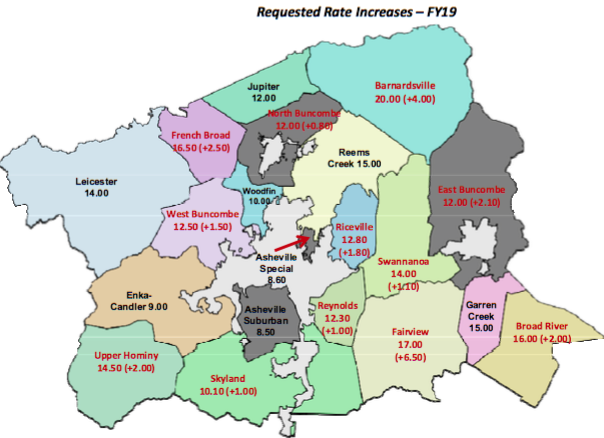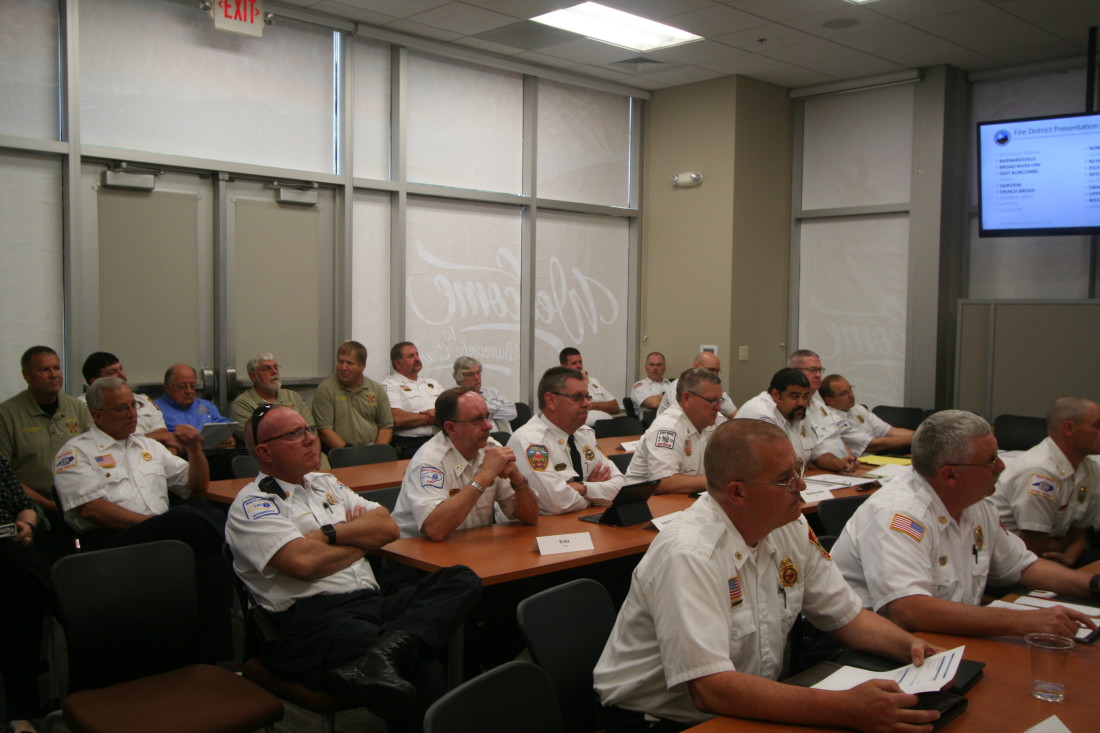At one time, Swannanoa Fire & Rescue was considered a minor-league farm team for the Asheville Fire Department, says Swannanoa fire chief Anthony Penland.
“Because it seemed like I would train all of these guys, like they do in the minor leagues, and then they would go on to the professional ranks there at the city,” Penland told the Buncombe County Board of Commissioners during a budget work session on May 8. “Serving our community is a privilege. Being able to retain our firefighters because we offer a competitive wage, that’s something we have to do.”
Since he became fire chief in 2001, Penland says he has lost more than 25 firefighters to other departments because he can’t offer a competitive wage. And Penland isn’t the only local fire chief that sees this as an issue.
Penland and chiefs from 11 other fire departments discussed employee retention and other issues with commissioners as the board plans the county’s fiscal year 2019 budget. The chiefs hoped to wrangle increases in fire tax rates for their districts from the process.
The requests range from 0.8 cents to 6.5 cents and, if approved as-is, they would equate to about $2.7 million in extra spending by the county. Last year, the county’s fire district operating budget was $28 million.
Retention prevention
Commissioners learned during a workshop in January that, based on the outcomes of a pay study conducted by the North Carolina Association of Fire Chiefs, fire departments in Buncombe County pay, on average, $2,452 to $51,071 below the pay scale of fire departments in North Carolina.
John Coffey, interim chief of the Riceville Volunteer Fire Department, said wages for firefighters at his department run 10-21 percent below the state average. The department is asking for a 1.8-cent increase in the fire tax rate for their district, which amounts to $130,000.
“We want to retain the employees that we have, and bring their wages up close to a living wage in Buncombe County,” he said. Since he’s been with the organization, the Riceville Volunteer Fire Department has lost eight people to agencies outside of Buncombe County, Coffey said. “We’ve lost people to other counties only because we couldn’t provide them with their needs.”

Skyland fire department chief Ryan Cole said his department has seen a 35 percent reduction in the number of employees living in the fire district over the last 10 years. He blames the high cost of living in Buncombe County.
“They’re either changing professions or most of them are actually moving out of the fire district to other counties because that’s where they can afford to live,” he said.
Skyland Fire & Rescue is requesting a one-cent increase in its tax rate. The primary reason for this request, Cole said, is to improve pay and benefits for firefighters. Cole said the department has firefighters who are paid 8 to 18 percent below the state average and supervisors who are paid 3 to 13 percent below the state average.
Meeting other needs
Several chiefs were also hoping to snag funding for equipment upgrades, infrastructure and new staff positions.
The largest request, a 6.5 cent increase in the district fire tax rate, came from the Fairview Volunteer Fire Department. Jeff Augram, the chair of the department’s board of directors, said the increase would help pay for construction of a new substation along US Highway 74A near Minehole Gap to provide additional services to the area around the Southcliff subdivision.
Augram said the substation would help that part of the district maintain a class 3 rating from the N.C. Department of Insurance. The department local fire services on a scale of 9 to 1. A low rating means that property owners in that district pay less money for fire insurance premiums.
“Class three definitely brings down the insurance rating for our commercial property owners; it doesn’t impact as much on the residential side of the street,” Augram told commissioners. He said there isn’t as much commercial development in Fairview as officials would like, but this substation could offer an incentive for future growth.
The department would also use the increase to fund salary and benefit upgrades, update old vehicles and add nine additional firefighters to meet national and state standards. Chief Scott Jones said the department has five trucks that are past due for replacement.
Jones said he has seen the cost of fire trucks drastically increase over the years. The department bought its 30-year-old truck for $100,000 back in the day. That same truck today, Jones said, would cost $500,000.
The FY 2019 requests are:
- Barnardsville: $0.16/$100 to $0.20/$100
- Broad River: $0.14/$100 to $0.16/$100
- East Buncombe: $.099/$100 to $0.12/$100
- Fairview: $0.105/$100 to $0.17/$100
- French Broad: $0.14/$100 to $0.165/$100
- North Buncombe: $0.112/$100 to $0.12/$100
- Reynolds: $0.113/$100 to $0.123/$100
- Riceville: $0.11/$100 to $0.128/$100
- Skyland: $0.091/$100 to $0.101/$100
- Swannanoa: $0.129/$100 to $0.14/$100
- Upper Hominy: $0.125/$100 to $0.145/$100
- West Buncombe: $0.12/$100 to $0.135/$100
You can read more about the requests at the meeting agenda page on the Buncombe County website.
The proposed FY 2019 budget will be on the agenda during the board of commissioners meeting on Tuesday, May 15. The county will hold a public hearing on the budget on Tuesday, June 5, and commissioners will render their final decision on Tuesday, June 19.



Before you comment
The comments section is here to provide a platform for civil dialogue on the issues we face together as a local community. Xpress is committed to offering this platform for all voices, but when the tone of the discussion gets nasty or strays off topic, we believe many people choose not to participate. Xpress editors are determined to moderate comments to ensure a constructive interchange is maintained. All comments judged not to be in keeping with the spirit of civil discourse will be removed and repeat violators will be banned. See here for our terms of service. Thank you for being part of this effort to promote respectful discussion.